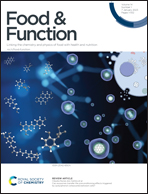Protective effects of Lycium barbarum L. berry extracts against oxidative stress-induced damage of the retina of aging mouse and ARPE-19 cells†
Abstract
In this study, we investigated the preventive effect of Lycium barbarum L. berry extract on age-related macular degeneration (AMD) and the main components responsible for its antioxidant activity. An AMD mouse model was developed by feeding 18-month-old mice with a 1% hydroquinone diet. Meanwhile, the model mice were treated with water extract (LBW) and alcohol extract (LBE) of L. barbarum berries respectively for 3 months. It was found that the retinal structural abnormalities were improved and the oxidation stress and inflammatory imbalance were both attenuated in model mice treated with the extracts of L. barbarum berries. According to the metabolomics analysis of the serum of model mice, LBW regulated the metabolism of unsaturated fatty acids and sphingolipids, while LBE extracts tended to regulate taurine metabolism. On sodium iodate induced oxidative injury of ARPE-19 cells, water extracts of L. barbarum berries eluted with 95% ethanol (LBW-95E) on AB-8 macroporous resin significantly improved the cell viability and attenuated oxidative stress by increasing the superoxide dismutase (SOD) activity and glutathione (GSH) content, decreasing the reactive oxygen species (ROS) content, promoting the entry of nuclear factor erythroid-derived 2-like 2 (Nrf2) into the nucleus and up-regulating the heme oxygenase-1 (HO-1) expression. Scopoletin, N-trans-feruloyltyramine and perlolyrine were identified as the main components of LBW-95E. These results demonstrated that L. barbarum berry extracts protected the retina of aging AMD model mice from degeneration and LBW-95E was the vital antioxidant activity fraction of LBW. These findings suggest that L. barbarum berry extracts might be an excellent natural source for the development of retinal protection-related drugs or dietary supplements.



 Please wait while we load your content...
Please wait while we load your content...